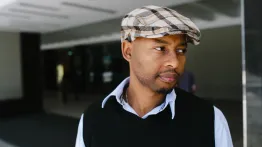Three Questions for Mokena Makeka
POSTED ON: October 12, 2023

This month, Mokena Makeka joins the Cooper Union community as special advisor to the vice president of academic affairs. Makeka, who was raised in Lesotho and New York, is an award-winning architect and globally recognized expert in urban design and strategy. He brings to Cooper a range of global experience in architectural practice and higher education with a focus on design and regenerative development, inclusive economies, geo-political economics, and the post-colonial landscapes of the African continent and Sub-Saharan Africa, the Americas, and Europe. In this new role, Makeka works in partnership with Hayley Eber, acting dean of The Irwin S. Chanin School of Architecture, and Demetrius Eudell, vice president of academic affairs, while also collaborating on interdisciplinary initiatives across the institution.
We asked Mokena Makeka a few questions about his work and his thoughts on joining our community.
What drew you to The Cooper Union?
Where do I begin? It’s quite easy to reference world-recognized alumni or seminal acts of thought that have shaped our definition of democracy, human rights, etc. and how such emerged from the hallowed halls and corridors of The Cooper Union. Yet to do so might cast a shadow on the deeper and more insistent project to infuse the pedagogies of art, engineering, architecture, humanities, and social sciences toward an enlightened mode of curious practice that tackles the wicked problems of our time. Peter Cooper sought to achieve civic virtue and harmony in the context of inclusive prosperity, and this is an enlightened mission to which I am proud to harness my efforts.
Tell us about your interests as an architect.
I see architecture as the philosophical art of curating space and its uses, and manipulating form is one of the primary tools we deploy to that objective. Whilst the formulation of the built environment from doorknob to skyline fascinates me, I am seized by the question of the “politics of use,” i.e., what we as architects can do to reshape the “polis,” physically and phenomenologically. Design is charged with the potential to recalibrate lives for better or for worse, and through its artistic and technical rigor can redefine various potentialities; spatial, socio-economic, ecological...
Whilst I have no strict typological alignments, the role of architecture as public and critical social commentary is important to me, through an ethos that sees the client as an intergenerational societal voice, inclusive of nature. As such, bio-urbanism, or nature-positive development in which architecture situates itself as an informed interlocutor between planet, people, and prosperity, is the locus of my interest, and I believe that architecture is the most enduring and often most visible proof point of any broader system change. Design is poesis and politics; a continuous negotiation between science and art mediated by the murmurs of the heart and the coolness of intellect. It reveals the density of cultural foliation.
What are you most looking forward to in your role at Cooper?
I seek to be an ally in the pursuit of a transdisciplinary process that allows us to innovate separately and collectively. The passion of the faculty and the students has always been infectious, and I revel in the subtle moments when a lifted eyelid reveals a spark of new insight, or the birth of a hypothesis that is in dire need of testing. I enjoy co-creating knowledge and systems to deploy those ideas in an iterative fashion, and I am motivated by impact beyond the physical boundaries of our academic terroir.
For example, Plato believed that poetry was “irrelevant,” as he was interested in corporeal reality, and Aristotle in contrast believed in the site of the imagination as the first place of “making.” Ergo, Plato found poetry a distraction. And Aristotle found it a vital part of “being.” Aristotle likened poetry to music and order, but Plato linked poetry to painting and found it to be indulgent, unstructured, and lacking philosophy. The tension here, as it were, is on the question of form versus function and how they defined function and form.
As someone who is deeply influenced by Plato’s cave as a mimetic device of being, I find myself drawn to language, words, music, and philosophy as the means by which creativity finds deep meaning, and yet we have a duty to purpose, a duty to “reality.” I associate Cooper Union with these productive tensions, and the place where, like Aristotle and Plato, we can wrestle with being and meaning simultaneously through the evolving rigor of our disciplines. I am delighted to be part of this community and its ambition to unlock its full potential. Whilst I am an architect at heart, I believe that the wicked problems of this world require transdisciplinary communities and debates of practice, and I can’t think of a better place to explore that potential.




